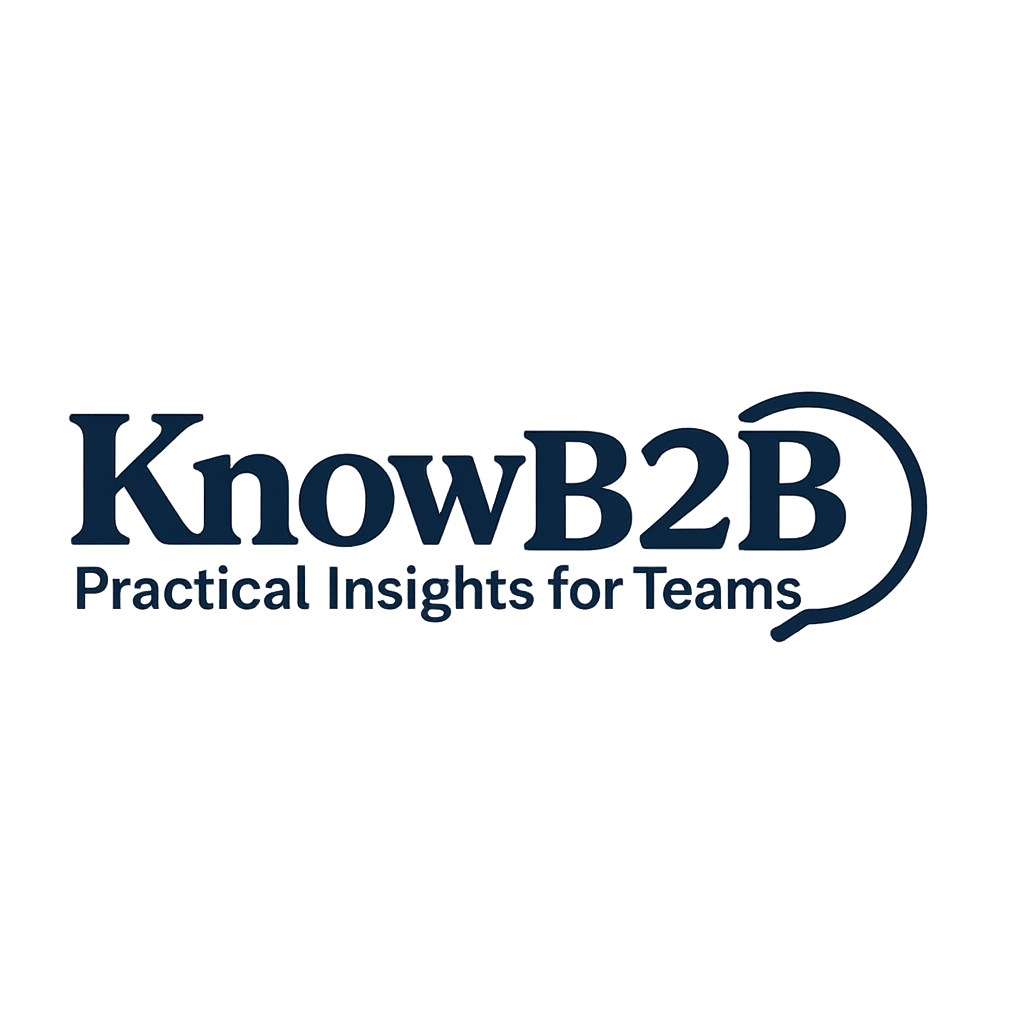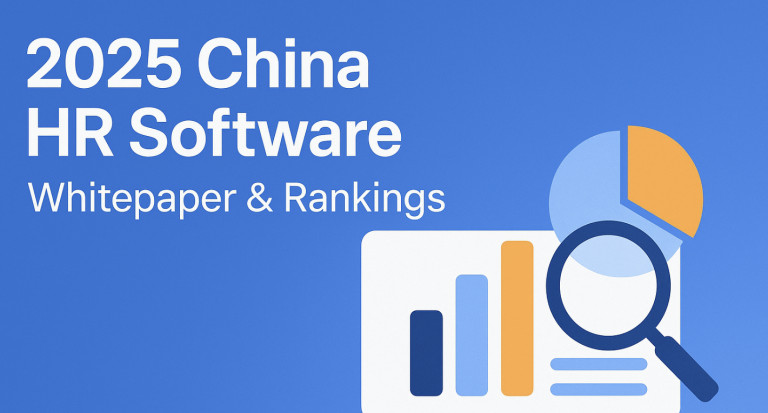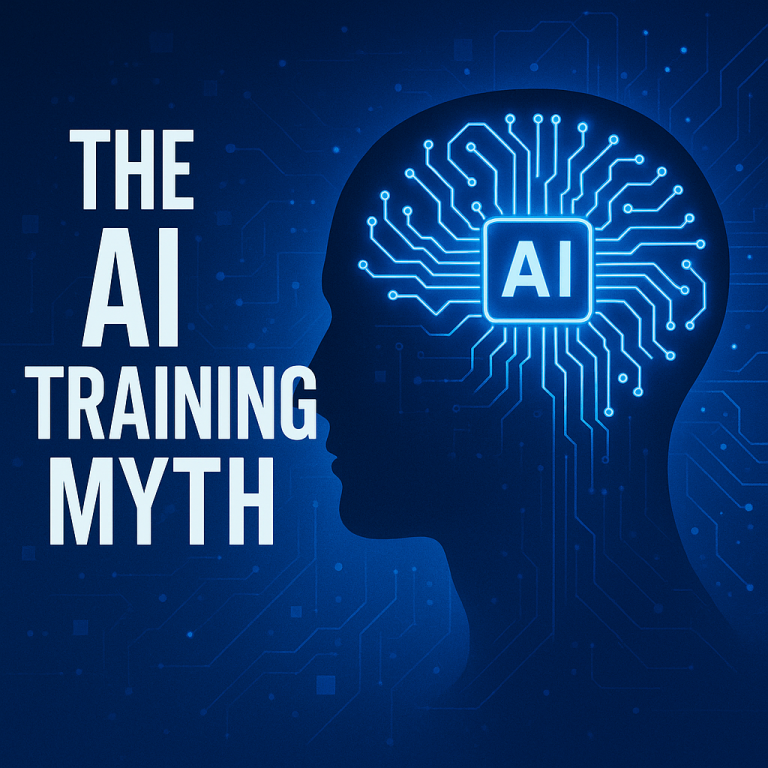一、Executive Summary
As small businesses grow beyond 10–15 employees, administrative burdens around onboarding, payroll, compliance, and employee engagement quickly escalate. To manage this complexity, HR management systems (HRMS) have become a critical investment — not just for HR professionals, but for operations leaders, founders, and finance teams.
This guide evaluates 7 leading HR platforms for small businesses in 2025, based on a structured review framework including:
- Core HR capabilities (employee records, leave tracking, org charts)
- Payroll & compliance support
- Talent management features (onboarding, performance, ATS)
- Ease of use, scalability, and cost
- Suitability for businesses with fewer than 100 employees
Each platform is assessed by fit-for-purpose, not just feature count — recognizing that small businesses often prioritize simplicity, local compliance, and ease of onboarding over complex enterprise capabilities.
二、Market Context: Why HRMS Is Now Essential for Small Businesses
“By 2026, 60% of small businesses will use integrated HR platforms to reduce compliance risks and improve workforce visibility.”
— KnowB2B 2025 HR Tech Outlook
The HR tech landscape has evolved rapidly. Cloud-based, modular HR platforms now enable small companies to:
- Avoid spreadsheet chaos
- Stay compliant with local labor laws
- Offer better employee experiences
- Automate recurring tasks like payroll and PTO tracking
- Support remote and hybrid workforces
However, the market is fragmented. Vendors target different niches: U.S. payroll, global hiring, shift-based scheduling, or tech-savvy teams. This guide helps cut through the noise.
三、Evaluation Methodology
Each vendor was evaluated across five dimensions relevant to small businesses:
| Criteria | Description |
|---|---|
| Core HR Functions | Ability to manage records, time off, compliance |
| Ease of Use | Time to deploy, UI clarity, non-HR user access |
| Scalability | Can it grow from 10 to 100+ employees smoothly? |
| Total Cost | Transparent pricing and feature-to-price ratio |
| Specialization | Fit for specific use cases (e.g. hourly teams, remote workers) |
Sources include product documentation, vendor demos, verified G2/Capterra reviews, and KnowB2B’s in-house evaluations.
四、Comparative Summary: Quick Snapshot
| Vendor | Best For | Global Support | Payroll Included | Free Plan |
|---|---|---|---|---|
| Gusto | U.S. payroll + onboarding | ❌ U.S. only | ✅ Yes | ❌ No |
| BambooHR | All-in-one HR with PM add-ons | ➖ Partial | ❌ Add-on | ❌ No |
| Zoho People | Customizable low-cost HRIS | ✅ Yes | ❌ Integrate only | ✅ Yes |
| Rippling | IT + HR automation for tech teams | ✅ Yes | ✅ Yes | ❌ No |
| Homebase | Hourly teams (retail, F&B) | ❌ U.S.-centric | ✅ Yes | ✅ Yes |
| Deel | Global hiring & contractor payroll | ✅ Yes | ✅ Yes | ❌ No |
| Eddy | Simple HR + recruiting for SMBs | ❌ U.S. only | ❌ Add-on | ❌ No |
五、Vendor Profiles
🥇 1. BambooHR
Best for: Small teams scaling toward 50–150 employees
- Strengths: Clean UI, intuitive workflows, modular pricing
- Core Modules: HR database, PTO, onboarding, e-signatures
- Add-ons: Performance, payroll (U.S. only), ATS
- Weaknesses: Advanced features cost extra
✅ Why we recommend it: Excellent balance between simplicity and depth. Ideal for HR teams formalizing processes.
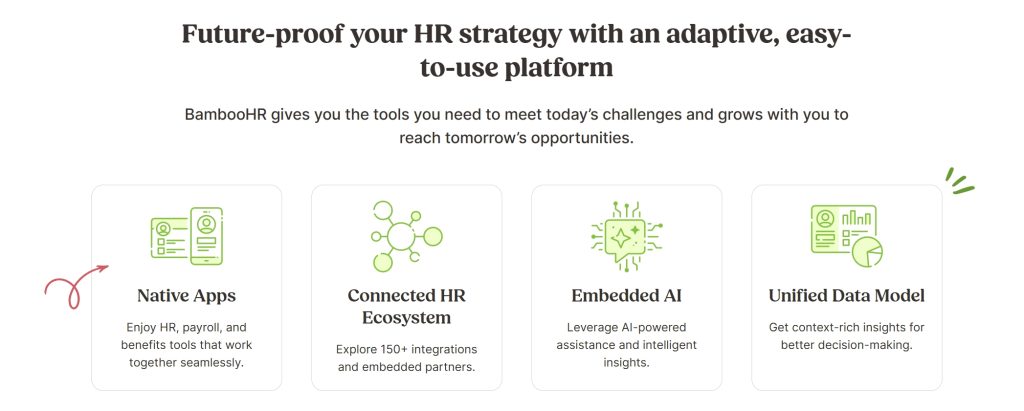
🥈 2. Gusto
Best for: U.S.-based companies prioritizing payroll and compliance
- Strengths: Payroll, tax filing, benefits, new hire onboarding
- Weaknesses: Weak outside U.S.; minimal talent tools
✅ Why we recommend it: If payroll is your #1 need, Gusto is purpose-built and easy to manage without HR expertise.
🥉 3. Zoho People
Best for: Small companies that want flexibility + integrations
- Strengths: Time tracking, shift scheduling, API & Zoho suite
- Weaknesses: Some complexity in setup
✅ Why we recommend it: Highly cost-effective, works well for tech-savvy teams or those using Zoho CRM/Books.
4. Rippling
Best for: Startups needing both IT and HR automation
- Strengths: Unified employee provisioning (apps, devices, payroll)
- Weaknesses: More expensive; setup time required
✅ Why we recommend it: Combines HR + IT workflows in one place — rare and powerful for tech-focused companies.
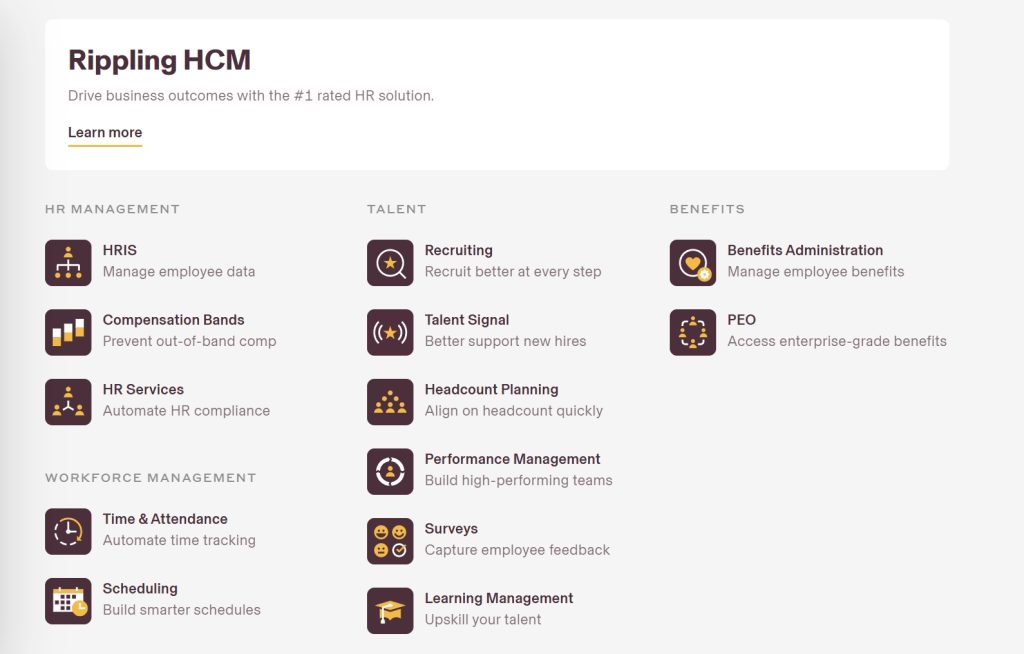
5. Deel
Best for: Teams hiring across borders
- Strengths: Global compliance, contracts, payroll in 150+ countries
- Weaknesses: Not cost-efficient for local-only hiring
✅ Why we recommend it: Avoids legal headaches if hiring remote contractors or global employees without entities.
6. Homebase
Best for: Shift-based teams (retail, food service, hospitality)
- Strengths: Scheduling, messaging, time clocks, labor law alerts
- Weaknesses: HRIS and performance features are limited
✅ Why we recommend it: If your biggest challenge is managing hourly shifts, Homebase is unbeatable — and has a free tier.
7. Eddy
Best for: U.S.-based SMBs seeking simplicity + ATS
- Strengths: Core HR + built-in recruiting
- Weaknesses: Limited integrations, still maturing
✅ Why we recommend it: Purpose-built for small business HR, not enterprise workflows. Easy to learn, fast to deploy.
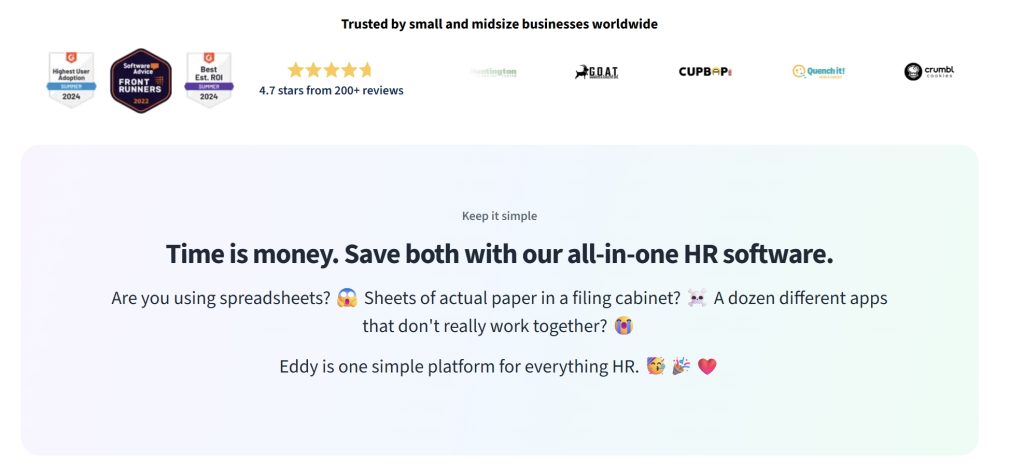
六、Final Recommendations
| Scenario | Recommended System |
|---|---|
| Need fast, compliant payroll in the U.S. | Gusto |
| Scaling HR with performance + ATS | BambooHR |
| Global contractor hiring | Deel |
| Shift-based or hourly teams | Homebase |
| Low-cost, highly customizable HRIS | Zoho People |
| All-in-one HR + IT automation | Rippling |
| Recruiting and onboarding in one tool | Eddy |
七、Conclusion
There’s no universal “best” HR platform for small businesses — only the best fit. Your ideal system depends on geography, hiring model, growth plans, and internal capacity. As 2025 HR tech continues to specialize, small businesses have more affordable, powerful options than ever.
Choose a platform that matches your current complexity — but can scale with your ambition.
✅ Next Steps
- Schedule demos with 2–3 shortlisted vendors
- Prepare a requirements checklist with your team
- Test UI/UX with a real onboarding or PTO process
- Ensure integrations with payroll/accounting/CRM systems
- Start small — automate one thing first, then expand
